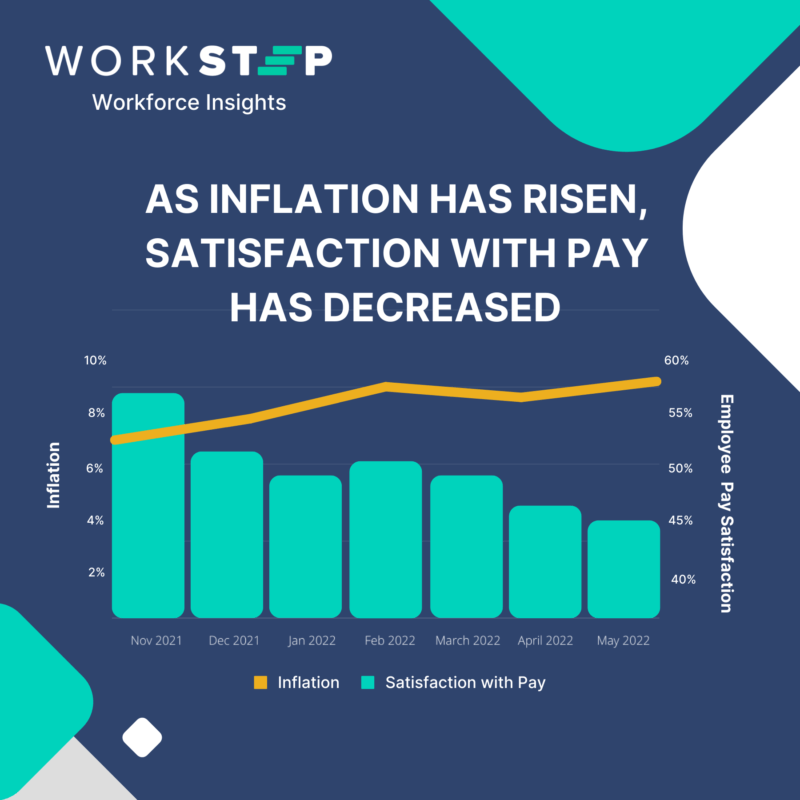1. Adopt an accessible employee engagement platform
Non-desk workers typically don’t have access to work email or company intranet. In fact, many frontline workers are never even assigned a company email. That’s why it’s important to find a way to communicate and gather feedback from employees through their personal mobile devices.
According to a report by The HR Research Institute, 48% of companies without established communication platforms see a low level of employee engagement. Low engagement can lead to low satisfaction, and possible turnover.
Are you looking for a powerful tool to boost frontline worker happiness and improve retention rates? Look no further than WorkStep’s employee retention software, which provides a range of features and insights designed to support your efforts and help you achieve success.
2. Ask for employee feedback
Regular check-ins that ask employees to provide feedback is essential to helping improve satisfaction. Studies show that 66% want the opportunity to provide feedback to employers at least once a month.
According to the Forbes Human Resources Council, employees are 74% more likely to actually leave feedback, and that feedback is more likely to be honest, if it is anonymous.
3. Act on employee feedback and communicate back
Just asking for feedback isn’t enough. A company must act on the feedback they receive. Otherwise, gathering feedback with no action could have a negative impact on employee happiness.
If you give employees a voice, but never listen, their voice does not feel valued, and engagement will feel like a waste of time. Frontline workers say they are 89% more likely to stay in a position if they feel their employer encourages and listens to feedback. Yet 36% of employees say they either don’t have a feedback program at work, or they don’t know about one if it does exist.
Once a feedback system has been implemented, it’s important to spread awareness about it to deskless workers. Including information about it in onboarding presentations is a good start, and continuing to promote it around the workplace with signage can help boost engagement as well.
4. Help employees feel valued
Communication and engagement plays a huge role in making an employee feel valued. But it’s also important to celebrate team and individual successes. Doing this for frontline workers can be tricky, but making the effort can go a long way in improving company morale.
Everyone likes recognition for a job well done, and it often leads to higher engagement and productivity when these accomplishments are acknowledged. Having a feedback platform like WorkStep that allows you track the success of initiatives like this can actually help you see the positive impact recognition has on employee satisfaction.
5. Make employee health a priority
There are many workplace factors that are more important to a frontline worker than pay. Once the pandemic hit, health became significantly more important. While many industries moved to remote work, supply chain businesses were forced to remain in-person, leaving those employees at higher risk.
Without federal paid sick time mandates in place, many hourly workers feel they can’t miss work due to illness since they can’t afford to lose out on pay. This either means an employee comes to work despite being sick, or that they have to leave the job altogether in order to care for someone else.
Ways companies can support this is by offering:
- flexible scheduling
- paid sick time
- listening to feedback on the needs around health and safety
Building a strategy to keep frontline workers happy
Deskless workers face a different daily environment than remote or desk-bound employees, which means their needs are significantly different. Finding out what these needs are can be much more challenging. Keeping hourly employees happy begins with establishing communication and engagement. By choosing an employee feedback platform that can be delivered to mobile devices can:
- Improve employee engagement
- Provide insights into what initiatives companies should take to improve satisfaction
- Track the success of these initiatives
- Significantly lower frontline worker turnover
Tune into your frontline with WorkStep
With the frontline employee engagement platform that delivers the real-time insights you need to take action, retain your workforce, and drive your business forward.
Kristina Finn, Content Marketing Manager | kristina@workstep.com



